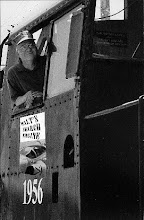40 Years and nothing has changed in book printing
I just sent our current book printer the following message, rejecting the book proof we just received from them:
"Our instructions clearly called for the cover hard copy to be scanned same size. Instead, the cover text has been reduced on the back cover and on the front cover from the book title down. The gold bars that connect the front cover to the back cover are missing on the spine. In your reduction of the text copy on the back cover, you turned the word 'meet' to 'mee' by lopping off the 't' and you eliminated the hyphen after 'Vietnam' in the same copy on the right. Re scan the cover same size and send another proof."
Technically, the world has changed enormously in the production of the printed word in the last 40 years. But the one thing that has not changed is printers not following publishers' instructions. When I was composing the message above to send to the printer, I started reflecting on this problem.
I have been employed to produce periodicals and books since 1964, minus two years in the US Army, for Dow Jones Books, Oxford Books (now Sadlier-Oxford), RCA Records, Weekly Reader Books and Southfarm Press for the past 25 years. And I still have to send rejections to printers because they don't follow publisher instructions. It's getting a little old.
The worst case I ever experienced was in 1995 after I received several samples for a hardcover book with a sewn binding for my approval. The bindings on the books were so bad, so loose, that I could not imagine what the printer was thinking when they were sent. When I requested a second set of books for approval, the ones then sent were just as bad. I decided that the only thing to do was to actually travel to Benton Harbor, Michigan, where the printer was located, from my office in Connecticut.
So, on a hot August 1995 day in Benton Harbor in a warehouse not air conditioned, I sorted through every carton of books, throwing the unacceptable ones on the floor. The pile amounted to over 10% of the books being bad.
The technology has improved. When is customer service and quality control in the printing/publishing industry going to improve?--Walter Haan, www.war-books.com
"Our instructions clearly called for the cover hard copy to be scanned same size. Instead, the cover text has been reduced on the back cover and on the front cover from the book title down. The gold bars that connect the front cover to the back cover are missing on the spine. In your reduction of the text copy on the back cover, you turned the word 'meet' to 'mee' by lopping off the 't' and you eliminated the hyphen after 'Vietnam' in the same copy on the right. Re scan the cover same size and send another proof."
Technically, the world has changed enormously in the production of the printed word in the last 40 years. But the one thing that has not changed is printers not following publishers' instructions. When I was composing the message above to send to the printer, I started reflecting on this problem.
I have been employed to produce periodicals and books since 1964, minus two years in the US Army, for Dow Jones Books, Oxford Books (now Sadlier-Oxford), RCA Records, Weekly Reader Books and Southfarm Press for the past 25 years. And I still have to send rejections to printers because they don't follow publisher instructions. It's getting a little old.
The worst case I ever experienced was in 1995 after I received several samples for a hardcover book with a sewn binding for my approval. The bindings on the books were so bad, so loose, that I could not imagine what the printer was thinking when they were sent. When I requested a second set of books for approval, the ones then sent were just as bad. I decided that the only thing to do was to actually travel to Benton Harbor, Michigan, where the printer was located, from my office in Connecticut.
So, on a hot August 1995 day in Benton Harbor in a warehouse not air conditioned, I sorted through every carton of books, throwing the unacceptable ones on the floor. The pile amounted to over 10% of the books being bad.
The technology has improved. When is customer service and quality control in the printing/publishing industry going to improve?--Walter Haan, www.war-books.com


0 Comments:
Post a Comment
<< Home